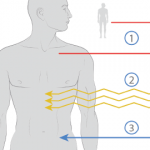NEW YORK (Reuters Health)—Careful use of antibiotics and corticosteroids can substantially improve the safety of autologous hematopoietic stem transplantation (HSCT) in patients with refractory Crohn’s disease (CD), researchers from Spain report.
“Autologous HSCT is feasible but it is associated with severe adverse events and even mortality,” Dr. Elena Ricart from Hospital Clinic de Barcelona tells Reuters Health by email. “Therefore, it is very important to adequately select the patients and refer those patients to experienced centers.”
“Autologous HSCT has been used for the past 20 years to control refractory immune-mediated diseases, including Crohn’s disease, although, due to safety concerns it is considered a salvage therapy for very severe and refractory patients,” she explains.
Dr. Ricart’s team reports on the results of 26 Crohn’s disease patients who underwent autologous HSCT at their center and describe measures they have undertaken to make the procedure safer.
After severe complications related to mobilization and transplantation at the beginning of their experience, they revised the procedure by conducting drainage of perianal disease beforehand, implementing strict hygienic contact measures, and developing adequate antibiotic prophylaxis schedules.
Moreover, to reduce the likelihood of reactions to rabbit antithymocyte globulin (rATG) (used for T-cell depletion), they administered high-doses (500 mg) of corticosteroids before each infusion.
Perhaps as a result of these measures, there were no further cases of bacteremia, septic shock, or multidrug-resistant bacterial infections after the first five patients. However, six patients (29%, including four pretreated with high-dose corticosteroids) developed rATG reactions.
One patient died during the first year of follow-up, the researchers report in Gut, online Nov. 19.
“Autologous HSCT may be considered for CD in patients with active disease uncontrolled by medical therapies, including immunomodulators, anti-TNF and vedolizumab—recently approved for CD, with extensive disease in which surgical resection would expose the patient to the risk of short small bowel syndrome,” Dr. Ricart says. “Also in refractory colonic disease and perianal lesions where proctocolectomy with a definitive stoma is not accepted by the patient.”
“The number of centers worldwide is limited, and it is recommended that these patients be referred to centers with experience and appropriate interdisciplinary interaction between hematological and CD specialists to select and manage CD patients,” Dr. Ricart adds. “Such centers should have JACIE [Joint Accreditation Committee for ISCT and EBMT] accreditation or equivalent.”

